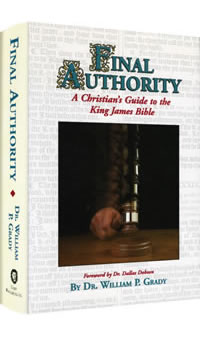Should Christians Scorn the Bible?
Satan has found a very sneaky way to get some believers to join him in disparaging God’s words. It centers around a growing “disaffection” with the Authorized King James Version. It occasionally shows up in conversation about the “KJO” (King James Only) movement, a term not usually complimentary.
How Satan got his foot in this back door is an intriguing story. It goes back to a time in the 1700s when questions arose concerning the language of the King James Bible. Some maintained that the language was obsolete and needed to be “updated.”
Of course, any time someone suggests the possibility of changing God’s words, loud alerts go off in the control room of hell, announcing the opportunity.
Undercover agents soon infiltrated the Bible societies that were assembled for the purpose. The grand plan was to sideline the many foundational documents leading up to the KJV that had been collected since the second century.
One of the key figures responsible for these early documents was Erasmus, who compiled a Greek New Testament which became known as the Textus Receptus. This was the target that had to be taken out if Satan’s plan would succeed.
In the scramble to find a replacement for the Textus Receptus, two documents surfaced that had very little or no history. One was in the Vatican library, where it was first catalogued in the late 15th century. The other appeared out of nowhere in the 1840s in a monastery on the Sinai Peninsula.
The two manuscripts, the Vaticanus and Sinaiticus, were chosen by “scholars” Brooke F. Westcott and Fenton J.A. Hort as the primary basis of a new Greek New Testament to be used in place of the Textus Receptus documents to update the KJV.
However, these manuscripts contained errors and omissions, differing significantly from the Textus Receptus. But Satan’s undercover agents succeeded in persuading the Bible societies that these documents, without provable history, were indeed very early manuscripts.
A revision committee was formed that produced a new English New Testament that not only updated the language but changed the text in significant places. It became known as the 1881 Revised Version (RV).
There were a lot of crosswinds and developments during the 19th century. Charles Darwin and company were major players in the growing field of science. Industrialization brought inexpensive printing. Increased communication media allowed advertisers to present these printed books to a wide market. Many publishing houses prepared different study Bibles, using the new revised Greek created by Westcott and Hort.
But the stubborn King James version continued to be wildly popular. Even so, modern marketing strategies are very effective when applied to promoting a favored product —or skewering a competitor. Today, this tendency to scorn the King James testifies to the effectiveness of the negative PR campaign mounted against it.
In summary, God gave the English world the Bible in a classic, timeless language. Its text rests on a solid foundation of over 5000 manuscripts carefully preserved and copied for over 20 centuries. But Satan and his minions are in the shadows, high-fiving each other over their success. Most churches now use a muddle of Bibles, based on a few defective manuscripts.
Can God be pleased when we dare to even border on scorning the Bible that proved its power during 400 years of the greatest expansion of the Kingdom of God in history?
Author David W. Daniels has spent over 20 years researching this intriguing story of Satan’s monstrous plot against God’s words. The details are in over a dozen books that he has written and are available from Chick Publications.
- See more articles on related topics:
- Bible Versions
- King James Bible
Other Articles from November/December 2022:
More on Bible Versions:
Products of Interest:
-

Understandable History of the Bible
557 pages
You'll learn the history of the Bible in this well-documented but easy-to-understand book. -

Final Authority
392 pages
Reading much like a novel, this book tells the story behind the King James Bible, and the story of attempts to stop it through intrigue, slander and attempted murder of the King.



